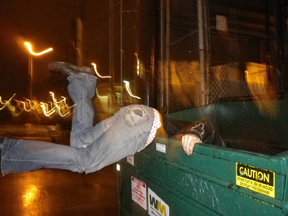by David HGB Giles,
Fellow, Society of Scholars, Simpson Center for the Humanities
Doctoral Candidate, Department of Anthropology
University of Washington, Seattle
My favourite Dumpster is locked.
I’ve been coming here for a few years, but now the lid is closed, and there’s a cable lock threaded through it to keep scavengers out. Scavengers like me.

Until now, I’ve poked happily about in the soggy detritus without obstacle. Hiding in plain sight at the end of a gravel driveway, outside the chain-link fence of a warehouse in Seattle’s industrial district, the Dumpster always promised at least a few unopened bottles of top-dollar organic fruit smoothies to the intrepid Dumpster-diver. Mango Madness. Orange Carrot. Hermetically sealed and conserved by Seattle’s frigid night air, they were nonetheless too close to their sell-by dates to be worth shipping, so they ended up here. On the right night, there were hundreds of them. There probably still are.
So why lock them up? My research with Dumpster-divers and grocers in Seattle and other cities around the US, Canada, and Australasia, explores the politics and the cultural economy of waste—particularly food waste. It echoes John Steinbeck’s dry observation of depression-era surplus and scarcity in The Grapes of Wrath: “The works of the roots of the vines, of the trees, must be destroyed to keep up the price.” According to the USDA, for example, 5.4 billion pounds of unspoiled food are discarded by US merchants each year. A simple thought experiment and some rudimentary economics suggest that, if these edible surpluses were given away indiscriminately, the principles of supply and demand would undercut food prices. To paraphrase Steinbeck: Who would pay five dollars for a smoothie when they could pull ten of them out of the trash for nothing? In other words, what we throw away remains significant in its absence.
Of course, Dumpsters are not locked out of sheer Machiavellian cunning. Nor is food discarded with a calculating twirl of the capitalist’s moustache. Rather, food is wasted because it circulates according to its exchange value rather than its use value. Eleven perfectly good eggs and one cracked one are no longer legible in the way an intact dozen is, for example. And a bruised apple merely takes up space on a shelf next to another perfect one. A thing’s exchange value is, by definition, reckoned through comparisons. The apple that won’t sell, or won’t sell quickly enough, disappears from the shelves to make room for newer stock. So right up until the point of sale (or disposal), its value is virtual. Like Schrodinger’s cat, its fate waits upon one decisive moment.
Of course, what makes that moment decisive is the finality of the Dumpster—the “point of no return” in the social life of a thing. In other words, most people are averse to digging through the trash. And for this reason, businesses often don’t see a need to lock up their waste. Increasingly, however, Dumpster-divers are showing up on their radar. For many of Seattle’s Dumpster-divers, for example, the aforementioned “Juice Dumpster” had become as much a household name as the company’s brand name itself. (Along with the “Chocolate Dumpster,” the “Burrito Dumpster,” etc.) Until now, they didn’t trouble the distributor enough to lock it up. I’ve known Dumpster-divers to openly clamber into it in front of the employees—I even once met a sanitation worker who saved some bottles for himself before emptying the rest into his garbage truck. However the popularity of this Dumpster has grown over the four years in which I’ve been conducting this research. And recently, a threshold has been crossed. Dumpster-divers I have interviewed in other cities have told me similar stories—of certain Dumpsters’ high profile and their consequent enclosure.
The proliferation of locked Dumpsters, then, may be proportional to the growing public profile of Dumpster-divers’ cultural and political activities in general. From the appearance of subcultures like freeganism which embrace Dumpster-diving, squatting, and other modes of surplus living, to movements like Food Not Bombs and Occupy Wall Street which depend on free access to food, space, and other resources to take direct political action, urban scavengers represent an ongoing effort to turn commercial waste into new kinds of food sovereignty, non-market value, and political influence.
This raises a variety of questions about the ways in which businesses, governments, and the scavengers will respond to each other. It seems likely that more Dumpsters will be locked up, for one thing. In turn, Dumpster-divers have always been creative about gaining entry. They’re bound to become more creative. I’m left wondering what will become of my favourite Dumpster.